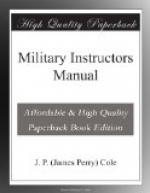Rests.
POSITION OF REST AND AT EASE.—When men are standing at rest or at ease they must be cautioned to avoid assuming any position that will nullify the object of the position of Attention. Standing on one leg, folding arms, allowing shoulders or head to droop forward, must be discountenanced persistently until the men form the habit of resting with feet separated but on the same line, hands elapsed behind the back,—head, shoulders and trunk erect, (m.p.t., pp. 21 and 22.)
FALL OUT.—Leave ranks.
REST.—One foot in place.
Can talk.
AT EASE.—One foot in
place. Silence.
PARADE REST.—Do not slouch
down on right foot. Keep chest well up.
EYES RIGHT, 2. FRONT.—Have
it snappy.
RIGHT FACE.—To face in
marching and advance, turn on the ball of
either foot and step off with the other foot in the
new line of direction. (Do not confuse with the ordinary
command, “Right Face.”)
RIGHT HALF FACE.—45 degrees,
used to show position in Right Oblique.
ABOUT FACE.—Have weight
well back. Not necessary to move right foot
after turn is made.
HAND SALUTE.—Manner of
rendering is index to manner in which all
other duties are performed.
FORWARD MARCH.—Shift
weight to right foot, mentally.
DOUBLE TIME, MARCH.—Tendency
to go too fast. Time it. 30 steps in 10
seconds. Take one step quick time, then take
up double time.
MARK TIME, MARCH.—Given
as either foot strikes the ground. To resume
full step, Forward, March.
HALF STEP, MARCH.—All
steps and marchings executed from a halt,
except Right Step, begin with left foot.
RIGHT STEP, MARCH. BACKWARD,
MARCH.—Executed in quick time only and
at trail, without command. 15 inch Step.
SQUAD, HALT.—Given as
either foot strikes the ground.
BY THE RIGHT FLANK, MARCH.—Step
off with right foot.
TO THE REAR, MARCH.—Given
as right foot strikes the ground. If
marching in double time, turn to the rightabout taking
4 steps, in place, in cadence, and step off with left
foot.
CHANGE STEP, MARCH.—Being
in march; given as either foot strikes the
ground.
Manual of Arms.
PURPOSE.—To make the man so accustomed to the rifle that he handles it without a thought.
Eight rules govern the carrying of the piece. See paragraph 75, Infantry Drill Regulations.
Six rules govern the execution of the manual. See paragraph 76, Infantry Drill Regulations.
Commands and Cautions.
ORDER, ARMS.—See that all the fingers of the right hand are around the piece.
PRESENT, ARMS.—Left forearm horizontal and against the body.
PORT, ARMS.—Right forearm horizontal. Left forearm against the body.
RIGHT SHOULDER, ARMS.—Insist on an angle of 45 degrees. Trigger guard in hollow of shoulder. Right hand does the work.




